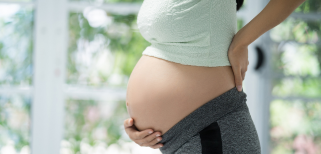




Health Information



Managing Back Pain During Pregnancy

Managing Back Pain During Pregnancy (by Sportsperformance Physiotherapy)
Back pain is a common complaint during pregnancy, affecting up to 50-70% of pregnant women. It usually begins around the second trimester as the uterus grows and places new pressure on the spine, pelvis and supporting muscles. Back pain often intensifies as the foetus continues to gain weight and the mother's centre of gravity shifts in the third trimester.
Tips summary to tackle back pain during pregnancy:
-
Consider using ice or heat therapy
-
Make use of support devices
-
Discuss with your healthcare provider on taking anti-inflammatories medicine
-
Sleep on your left side and use a support pillow under your knees to reduce strain on your back
-
Consider scheduling an appointment with a licensed healthcare professional, such as a physiotherapist, fascial stretch therapist or massage therapist, to help relieve back pain during pregnancy.
Pregnancy can be a wonderful time, but it can also bring about a host of physical changes and challenges, including back pain. The ligaments that stabilise the spine loosen due to hormonal changes, causing the joints to become less stable and prone to misalignment. The added weight of the growing baby also places strain onto the spine, pelvis and sacroiliac joints where the hip bones connect to the lower spine. This can cause muscle fatigue and pain in the mid and lower back, hips and pelvic floor.
Lifestyle changes and self-care techniques are the first defence against back pain during pregnancy. Wearing comfortable and supportive shoes instead of high heels can help, along with avoiding heavy lifting and strenuous activities. Sleeping on the side with a pillow between the knees and legs can alleviate pressure and discomfort at night.
Low-impact abdominal, back and pelvic floor exercises focused on strengthening the core muscles can provide relief. Prenatal yoga and physical therapy targeted at the impacted areas may also help. Over-the-counter pain relievers and topical creams can temporarily alleviate symptoms but should be used sparingly.
Heat and cold therapies can also provide relief from pregnancy back pain when used appropriately. If cleared by a healthcare provider, cold compresses like ice packs or frozen vegetables wrapped in a towel can be applied to the painful area for up to 20 minutes several times a day to reduce inflammation. If the aim is to reduce muscle tension, heat therapy may help more. Pregnant women can use heating pads or hot water bottles placed on the lower back, but should avoid applying heat directly to the abdomen.
Some postural adjustment exercise recommendations are available for cases with more severe pain, and clinical pilates is a form of exercise that can be particularly beneficial for pregnant women experiencing back pain. It focuses on strengthening the core muscles, improving posture, and increasing body awareness. Personalised clinical pilates as low-impact exercises could meet the unique needs of pregnant women, helping to improve pelvic stability and reduce strain on the back. Correcting biomechanical issues through postural adjustments and joint mobilisations can minimise pain and preserve mobility. However, pregnant women must consult a healthcare provider before starting any new exercise program, including clinical pilates.
Seeing an obstetrician is important if back pain suddenly intensifies quickly or is accompanied by new symptoms like numbness, leg weakness, incontinence, fever or vomiting. These could indicate more serious conditions like herniated discs, compression fractures from softening bones, pelvic girdle pain or early labour contractions.
Most back pain during pregnancy is musculoskeletal and resolves shortly after delivery or within a few months postpartum. However, staying active as tolerated and prioritising self-care can preserve mobility and functionality during this time.
Women can optimise their physical and mental health during pregnancy by getting adequate sleep, eating a balanced diet, and practising relaxation techniques. With the proper guidance from healthcare providers and support from family, mothers-to-be can find ways to manage back pain that honours both their physical limits and emotional needs. With patience and persistence, they can nurture their babies while nurturing themselves.
Learn more about Post-natal Physiotherapy and Women's Health Problems.
Further reading:



